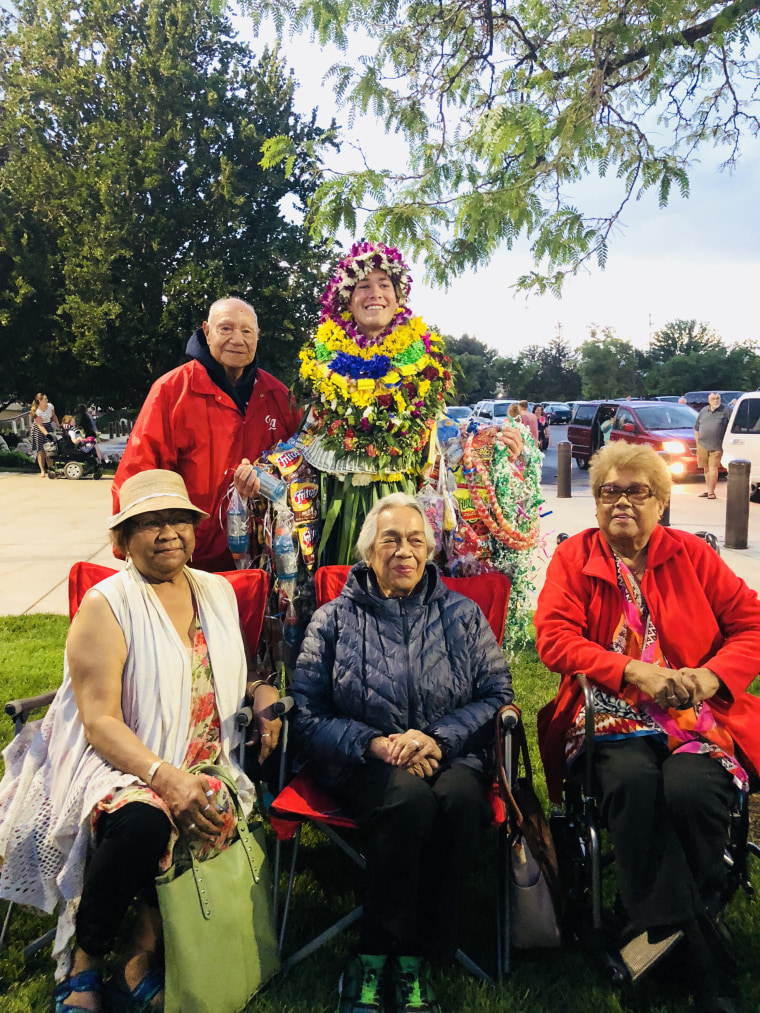Some high schools in Utah do not allow Pacific Islander students to wear leis at graduation, citing logistics and cleaning concerns from venues, but community activists say the practice is another example of the kind of cultural misunderstanding such students face on a regular basis.

The criticism found new prominence this week after an article in The Salt Lake City Tribune reported that a student had been asked to remove a "ta'ovala," an ornamental Tongan cloth worn around the waist during formal occasions, before entering the venue where his graduation ceremony took place.
Finehafo’ou Malohifo’ou, who is traveling to Tonga, where he plans to work on ancestral land with his family for the next five months before starting college at Utah Valley University, confirmed to NBC News that he was forced to remove his ta’ovala before his graduation ceremony on May 31. His family helped him put it back on afterward and then draped him in leis as originally planned.
“I felt, like, disappointed toward my school,” Malohifo’ou said. “I felt singled out, too.”
The school's principal said the aide who asked Malohifo’ou to remove the ta'ovala misunderstood the school's graduation rules.
But some high schools, citing the requirements of the venues where graduations are held, have not allowed the wearing of leis during commencement, said Susi Feltch-Malohifo’ou, Finehafo'ou's stepgrandmother and the executive director of the nonprofit Pacific Island Knowledge 2 Action Resources, which provides cultural, business and health programming.
The issue is not new. In 2005, Jamelle Avei, then the student body president at Wood Cross High School in Utah, spoke to his school's administration after learning that they were considering not allowing leis at their graduation, he said.
“Being student body president, I was granted the opportunity to speak,” Avei said by phone Wednesday. “When the ban was brought up, and it was lifted, and I was able to wear my leis. In my speech I directly spoke about the lei and what it meant to me. It’s just a representation of my culture, where I come from.”
Utah has the seventh-largest population of Native Hawaiians and Pacific Islanders in the United States, according to 2016 Census estimates, with more than 46,000 people of Native Hawaiian or Pacific Islander descent. Feltch-Malohifo’ou said the community came to Utah in part because of missionary activity by the Mormon church.
The Salt Lake City School District, whose student body is made up of mostly minority students, including 4.4 percent students of Pacific Islander descent, ran into issues this year because one of the sites it used for graduation ceremonies, Huntsman Center at the University of Utah, does not allow leis.
The district had previously hosted graduation ceremonies at the Huntsman Center, but was asked this year to disallow leis at the venue for the first time, according to district spokesperson Yándary Chatwin. The district hosted graduation ceremonies for four of its largest high schools there.
University of Utah communications director Chris Nelson said in an email that arena staff had asked local high schools to not allow flowers leis on the arena floor “based on logistics related to keeping the arena clean throughout the day and the quick turnaround time between graduation ceremonies.”
Nelson added that the university is looking at how things can be handled differently next year. “The university appreciates the opportunity to host these high school graduations and we will certainly work with school district officials on a solution that meets everyone’s needs,” he said.
Chatwin said the district is in talks with the center to allow leis.
“For us, this is an equity issue,” she said by phone. “And we want to make sure that as our students’ families gather to celebrate the culmination of their students’ public education that they are able to celebrate in a way that is meaningful for them and is respectful of their own cultures.”
For his part, Gary Twitchell, principal of Westlake High School, which Malohifo’ou graduated from and is not a part of the Salt Lake City School District, said that the school does not have a policy of baring traditional clothing under its graduation gowns.
He said in an email that he had spoken to the aide in question "to make sure that there is not a repeat of this incident."
“We desire that all people feel that they have been treated in a respectful and professional manner at all of our facilities and by our employees," he said.
The school established its graduation traditions when it opened in 2009, said Twitchell, who has been principal since 2015. Twitchell noted that leis and other adornment are allowed before and after the graduation ceremony as well as during organized recognition nights when students can take photos.
Both Feltch-Malohifo'ou and Avei attributed issues in part to a lack of cultural understanding between Pacific Islanders and the greater Utah community, which can cause friction. Avei noted, for example, that it is considered disrespectful to look elders in the eyes in some Pacific Islander households.
“I think that respect comes in all different ways,” Feltch-Malohifo’ou said. “It was just a mix-up, right? I feel that cultural translation is missing.”
Follow NBC Asian America on Facebook, Twitter, Instagram and Tumblr.

